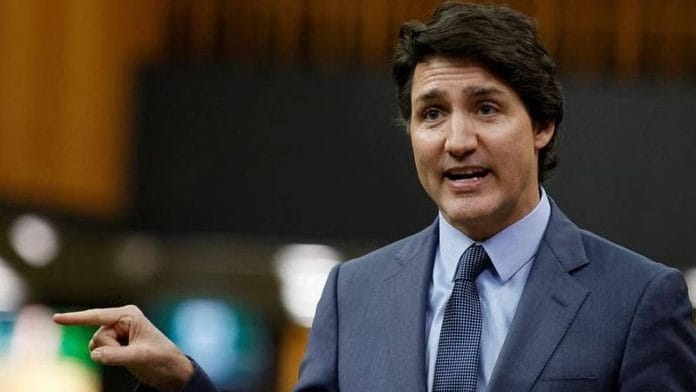New Delhi: Canadian Prime Minister Justin Trudeau said he wanted “people thrown in jail” and for Indian intelligence services to “change” the way they operate, while speaking about the killing of Sikh extremist Hardeep Singh Nijjar with editors and reporters of The New York Times (NYT) Thursday.
Nijjar was killed in Canada by unidentified gunmen on 18 June.
Trudeau visited the newsroom during his visit to New York for the ongoing UN General Assembly (UNGA) session this week.
A report by NYT correspondent Ian Austen Saturday gave details of the “hour-long” discussion. This comes days after Trudeau, on the floor of the Canadian Parliament, claimed his country is investigating the “potential role” of Indian agents in the crime.
“In a visit to The New York Times on Thursday, Trudeau said he wanted to see “a number of people thrown in jail”, plus “a series of lessons learned and changes made to the way Indian intelligence services operate”,” wrote Austen.
Asked what would be the most fitting resolution to the situation, the G7 leader was quoted as saying, “A number of people thrown in jail, convicted. A series of lessons learned and changes made to the way the Indian government and the intelligence services operate”.
In a column the previous day, American journalist and political commentator Nicholas Kristof said Trudeau did not share proof tying India to the killing, but added: “I’m betting it’s solid”.
This comes as other Canadian politicians, like British Columbia Premier David Eby, suggested the opposite.
Talking to reporters Friday, Eby said despite a briefing with the Canadian Security Intelligence Service (CSIS) director, he felt there wasn’t enough concrete information on the suggested link that Indian agents were involved in Nijjar’s killing.
Diplomatic tensions between Canada and India escalated this week after Trudeau’s remarks in parliament alleging India’s involvement in Nijjar’s killing — an allegation India has denied — triggered tit-for-tat expulsions of diplomats and travel advisories. The Indian government has also stopped issuing visas to Canadians and called on Canada to reduce its diplomatic staff in India.
Experts say the diplomatic row is a matter of “clout” on the global stage, at a time when Western countries have been wooing India which it sees as a counterweight to China.
Kristoff recalled Trudeau telling NYT staff: “If we, as we do, want India to continue down its path of democracy, of successful rising world power, we need to make sure we are clear about the responsibilities and the expectations that come with that”.
Trudeau on support from allies
Since Trudeau’s allegations on the floor of the Canadian parliament, Canadian allies such as the Five Eyes — an intelligence alliance between Australia, Canada, New Zealand, the UK, and the US — have backed the probe and called the allegations “serious”.
However, they also reportedly resisted attempts by the Trudeau government to issue a joint statement on Nijjar’s killing.
Asked whether allies are being supportive, Trudeau told NYT editors and reports that every ally he has spoken to has been “unequivocal that this sort of violation of a country’s sovereignty and of the rule of law is absolutely unacceptable”.
“I think people are quietly waiting to see how things unfold. But standing up for the rule of law isn’t a momentary thing. It’s a process that happens over weeks and months,” he said.
Trudeau has called on India to cooperate on the probe. However, the Indian Ministry of External Affairs (MEA) said Thursday that Ottawa is yet to provide any specific information about the case.
Claims have also emerged that an unnamed Five Eye nation provided intelligence to Canada about the probe, including “human” and “signals” communication. This was also confirmed by the US Ambassador to Canada David Cohen in an interview to CTV News channel Saturday.
Earlier this week, US Ambassador to India Eric Garcetti said he wanted to “allow the space for that information and that investigation to occur before anybody leaps to judgment”.
Meanwhile, talking to reporters Friday, Eby said despite a briefing with the Canadian Security Intelligence Service (CSIS) director, he felt there wasn’t enough concrete information on the suggested link that Indian agents were involved in Nijjar’s killing.
Eby claimed the Canadian government is “holding back” information and that everything he knows about the case so far is “in the public realm”. He called for reforms around the laws that don’t allow CSIS to share this information so that communities can be protected.
Eby is the head of the provincial legislative assembly in British Columbia.
Surrey, where Nijjar was killed, is located in this province.
(Edited by Poulomi Banerjee)
Also read: Justin Trudeau’s 15 seconds of fame—undoing two decades of India-Canada rebuilding ties






